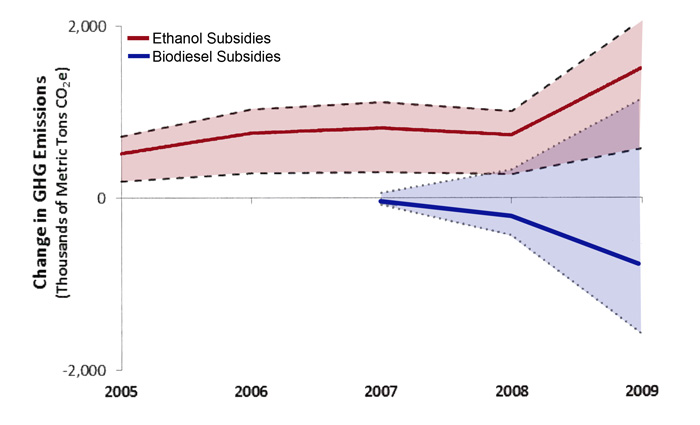| Follow @co2science |
Paper Reviewed
Allaire, M. and Brown, S.P.A. 2015. The green paradox of U.S. biofuel subsidies: Impact on greenhouse gas emissions. Economics of Energy & Environmental Policy 4: 83-102.
The increasing displacement of fossil fuels in the U.S. marketplace by biofuels has long been a goal of environmental activists who are concerned about potential climate-related impacts of fossil fuel consumption, as well as an over dependence of the country on foreign oil. Success of such activism is noted in the fact that federal government subsidies for biofuels have ratcheted up in recent years, from $1.7 billion in 2005 to over $6.6 billion in 2010. In addition, the federal government has established a biofuel policy (set by the Renewable Fuel Standard) mandating a four-fold increase in production, from 9 billion gallons in 2008 to 36 billion gallons by 2022.
In a paper published in the journal Economics of Energy & Environmental Policy, Allaire and Brown (2015) question whether the environmental goals intended by this policy will actually achieve their desired end (a reduction in greenhouse gas emissions) or have an opposite effect, as they note that "a subsidy for a biofuel can increase fuel use, and possible total greenhouse gas emissions, even when the biofuel has lower lifecycle greenhouse gas emissions than the conventional fuel it displaces." Thus, they set out to explore this hypothesis, specifically estimating the impact of U.S. biofuel subsidies on greenhouse gas emissions over the period 2005-2009. This required their developing an economic simulation model of U.S. energy markets (representing end-use consumption of coal, oil, and natural gas and electricity in four sectors) from which they could estimate and evaluate the impact of biofuel subsidies for ethanol and biodiesel. And what did that model reveal?
In the words of the two researchers, "we find that the subsidies for ethanol increased greenhouse gas emissions while those for biodiesel have an ambiguous effect" (see figure below). As for why this is the case, Allaire and Brown state that "although ethanol has lower lifecycle greenhouse gas emissions than gasoline, the subsidies lower the market price of blended fuel, which increases overall fuel consumption and increases total greenhouse gas emissions." And as a result, they say that "these findings question the suitability of using ethanol subsidies to achieve climate goals and highlight the importance of accounting for the price effect of biofuel policies," which accounting they note -- in criticism -- is presently not properly accounted for in regulatory analyses conducted by the EPA and other government agencies.

Aboveground net primary production (ANPP), measured in g/m2), shown in relation to site-level atmospheric N deposition. Adapted from Figure 3 of Stevens et al. (2015).Figure 1. Change in greenhouse gas emissions due to ethanol and biodiesel subsidies under a non-binding Renewable Fuel Standard. Adapted from Allaire and Brown (2015).




